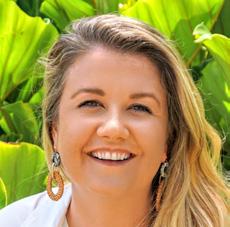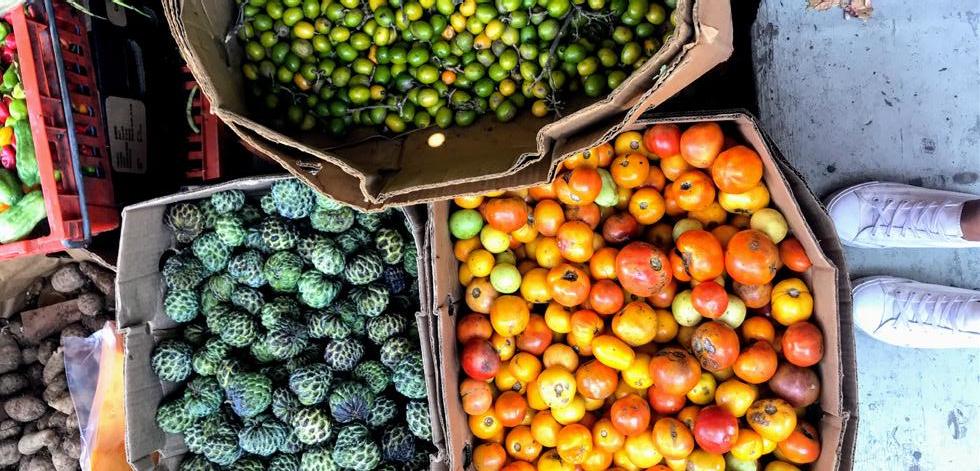
4 minute read
THE TIME IS RIPE FOR US TO SLOW DOWN OUR RELATIONSHIP WITH FOOD
Written by Malou Morgan - A Bajan entrepreneur and storyteller with a passion for all things social + sustainable.

Malou Morgan
In the space of a few weeks, our global food system was thrown off course. One could argue that the impact of COVID-19 on the food sector will be the most visible and important economic consequence. The changes are driven by many variables; namely a sudden shift to home preparation of food due to social distancing measures, risks of food shortage, as well as restrictions on international travel and trade.
It is still hard to believe that we could so drastically change localized food systems and our food sourcing habits in such a short space of time. And yet, here we are; growing kitchen gardens, connecting with our farmers and fisherfolk directly, and celebrating our cooking victories (and mishaps!).
Out of necessity, or perhaps out of boredom for some, Barbadians have been taking the first steps towards becoming more sustainable foodies.
Take our local farmers and fisherfolk, for example, traditionally, they were usually contracted to supply their bounty to various hotels and restaurants. However, the sudden national lockdowns and subsequent closures of many tourism based establishments,
found local producers without buyers and over abundance of stock. Rather than discard excess supply like our neighbors in the global North, our local farmers and fisherfolk were forced to adapt; and adapt they did. They commenced providing delivery services and developing direct relationships with household consumers. I look forward to my weekly delivery box of produce, delivered straight to my door.
Home delivery from a local farmer.

Photo: Malou Morgan
Another local initiative to be borne out of the pandemic is the #PantryChronicles series on social media, started by Tracy Fowler, a local media personality and an avid foodie. #PantryChronicles challenged people to get creative with whatever ingredients they had in their pantries during the lockdowns. Hundreds of people participated by sharing stories and videos of their adventures in the kitchen on Instagram and Facebook. Tracy single-handedly inspired so many people to share in her joy of cooking, with a heavy emphasis on local ingredients.
With everyone spending more time at home, people turned to their gardens. Our social media feeds were inundated with photos, videos and stories of kitchen gardens, green thumb adventures and homegrown produce. What seemed like a hobby only reserved for a select few before COVID “(BC)” is now considered trendy, therapeutic and practical. After realising how much love, time and resources go into growing a tomato, one develops a newfound respect for food and the people who provide it for us. Maybe it was seeing how vulnerable we are as a small island nation and recognising the power we have to change old habits if and when we need to. Or, maybe, it was standing in the lines at the supermarket for hours that forced us to change our behaviors. Either way, these instances made us realise that we are far more adaptable than we previously thought.
While there are so many aspects of our food production and supply that may seem beyond our control, there are a number of choices we can make as individuals that can have a profound effect on Barbados’ food culture. If you’re inspired to continue to further develop a more sustainable food culture, here are some things to consider:
Local fruit at a fruit vendor.

Photo: Malou Morgan
1. RECOGNISE THE POWER OF ONE - One person, one step at a time. The concept of sustainability can be incredibly overwhelming, but it’s important to remember that everyone started somewhere with one single action. Choosing not to support the industrial food system is the beginning of sustainable eating, from choosing to cut out meat one day per week or trying a new local fruit.
2. GIVE THE UNPOPULAR FOOD SOME LOVE - With most food groups - from seafood to fruit - we are often only focused on eating certain varieties. This causes an immense amount of strain on fish stocks, as well as perpetuating the issue of monocrop agriculture. We need to ease the demand for certain types of foods, by opening up ourselves to try new things. For example, there is a plethora of sustainable fish species out there, each with distinct flavors and textures. Slow Food Barbados has a list of sustainable seafood alternatives to the popular (and very unsustainable) marlin in their Barbados Sustainable Seafood Guide, which is free to download from their website. They also share a seasonal fruit calendar every month, which shows a surprising variety of fruit available here in Barbados.
3. EXPERIMENT WITH LOCAL ALTERNATIVES - Many popularised dishes call for imported ingredients. Challenge yourself to get creative in the kitchen and swap those imported ingredients for local alternatives. Not only will you reap the nutritional benefits of using local fruit, vegetables and products, you’ll also be supporting the local economy.
Barbados, the time is ripe for us to slow down our relationship with food. The pandemic has forced many of us to take the first step in becoming more sustainable foodies. We have started to question where our food comes from. We are growing more of our own food. We have learned the names of our farmers, fisherfolk and local producers. It’s important for us to positively learn from this pandemic, to be informed by the mistakes we have made in the past and to imagine a new future for our food system in Barbados.

Visit www.slowfoodbarbados.org to view the full "What's In Season" guide for Barbados.
Photo: Slow Food Barbados









